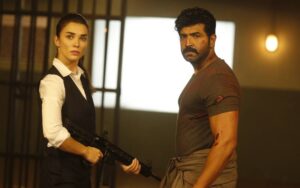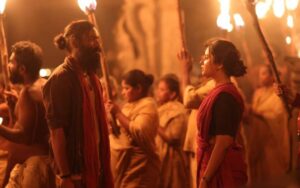Review: Kolamaavu Kokila
Director: Nelson; Cast: Nayanthara, Yogi Babu, Hareesh Peradi, Saravanan, Saranya Ponvanan and others; Music: Anirudh Ravichander; Cinematography: Sivakumar Vijay

Film: Kolamaavu Kokila
Director: Nelson
Cast: Nayanthara, Yogi Babu, Hareesh Peradi, Saravanan, Saranya Ponvanan and others.
Music: Anirudh Ravichander
Cinematography: Sivakumar Vijay
Director Nelson comes up with a sparkling dark comedy that appears to be a simple straight story when one looks at it superficially. However, to those with insight, it comes across as a story that has a deep, well thought-out plot with several layers. Each of the film’s layers is targetted at a specific audience group and delivers messages that best suit that particular group. This is something that is really difficult to achieve but something Nelson seems to have managed to conjure.
Kokila (Nayanthara) is a working woman whose salary is important to her family of four. Her father, a guard at a bank’s ATM, is an alcoholic, and an incompetent person. Therefore, his family, including his wife (played by Saranya Ponvannan), have little or no respect for him.
Despite working efficiently, Kokila is denied an increment in office because her manager seeks sexual favours. Although he does not spell it out, he keeps insisting that she meet him in private, outside office, if she wants a raise. The smart woman that she is, Kokila knows what is on his mind. She sharply but politely snubs him by telling him that if she wanted to get a raise in this manner, she could have done it by straightaway meeting the boss instead of him. The process, she reminds her manager, would have even resulted in him getting fired. Invariably, she knows she will be shunted out for this response. As expected, she is.
Having been shown the door, Kokila desperately looks for another job as her salary is important to run the family. After quite a search, she lands a Manager’s job in a spa. Her dad however is concerned that her new job profile might affect her prospects of finding a good bridegroom.
Kokila though isn’t worried. For her, the increased pay her new job offers is more important.
Just when she thinks that she has managed to overcome the crisis caused by her decision to quit her previous job, ill luck strikes. This time, in the form of Kokila’s mother, who is diagnosed with lung cancer. The doctors say her treatment will cost 15 lakhs and that she may have only two or three months left without treatment.
The family is shaken. Kokila tries all possible ways to generate the required funds for her mother’s treatment, but to no avail. Wherever she goes, doors are shut. People either question her ability to repay the sum or simply expect her to sleep with them. With no option left, Kokila and her sister decide to meet a broker and sell off a piece of land that the family owns. However, the broker tells them that the land will not fetch them more than a lakh and that too, only when a suitable buyer comes forward to buy it.
Disheartened by the developments and wondering what to do next, Kokila steps out of the broker’s office only to end up colliding with a drug peddler who is fleeing from cops. As a result of the collision, the criminal loses his balance and falls, giving the cops enough time to arrest him.
Unaware why the cops have arrested him, Kokila apologises to the man and begins to make her way home along with her sister. However, on the way back home, the two sisters are stopped by the gang members of the man arrested. The group, led by a drug peddler called Babu, tells Kokila that they will hold her sister hostage till the time she retrieves a drug package that the arrested man had left inside the complex before being arrested. Babu tells her that it was she who was instrumental in getting his man arrested and therefore she has to finish the job he was meant to do. With no option left, Kokila heads back to the same compound which is now teeming with cops. She finds the hidden drug package and hides it in her tiffen box before looking to make her way out of the complex. By now, cops have cordoned off the area and have begun searching all those present on the occasion. Kokila too begins to stand in the queue to be frisked by the cops…
To the normal, average viewer, the film is an entertainer that tells the tale of a middle-class woman, handling difficult situations that life throws at her in a humourous manner. To this viewer, the film is likely to come across as an entity with just one layer in it. This layer will be a fun-filled entertainer, with just the humour element of the film standing out.
To those who look beyond the obvious, there are other layers.
Layer two of this film is meant for feminists. To most feminists, this film is likely to come across as one that furthers the cause of women. This is because Nelson, in this film, sells the idea that this world is full of either incompetent men who are alcoholics, men who are egoistic with no reason to have such inflated egos, or men who are sexual predators who are lecherous in nature and who are constantly looking to outrage the modesty of every woman they come across.
All women characters, on the other hand, are portrayed as hardworking, efficient, skillful, polite, adaptable and tenacious individuals who are much better at handling situations than men. In fact, there is even a sequence in the film when the director has this dialogue on how a woman is much more efficient than 10 men put together. All of this is aimed at scoring brownie points from feminists. More importantly, what will appeal to feminists about this film is that it keeps portraying women as victims who pay the price for the mistakes of men.
Nelson does not stop with just that layer for feminists. For those with wisdom, buried under the layer for feminists, is another layer. And this one is likely to appeal to men’s rights activists. While it is true that the film glorifies women while hitting out at men, it also, subtly, ends up communicating two vital points that might delight men’s rights activists. The first fact that it showcases is how women can manipulate situations and men to take advantage of them. Nayanthara choosing to use Yogi Babu’s love for her to her advantage is one example. There are many more such instances. The other is the fact that women are as vicious as men, if not more when it comes to self-preservation is the second point that the film drives home. Although this is not too evident, the message is loud and clear to those who look for it.
So, in all, the film has three layers one each for a different category. The beauty is, at no point does one layer’s message contradict the message of another layer. Nelson’s story idea is fresh and his plot has adequate twists and turns to keep audiences engaged. In other words, this film is nothing like anything that the Tamil audiences have so far witnessed. And that, by itself, is the film’s biggest strength.
Next, Nayanthara plays a character that is quite different from her usual self. Be it her voice or her expressions, nothing is loud. Everything is toned and kept to a bare minimum. The only expression which exceeds that minimum point is sorrow. Nayanthara cries on a couple of occasions and even that is done softly. But this expression is by far the loudest in the film. This change in toning down of expressions and voice brings forth a new facet of Nayanthara, which is far more intriguing than the one that people have so far known. Full marks to the actress for having carried the film comfortably on her shoulders.
Yogi Babu is to be given equal credit for the entertainment the film provides. The man, who plays a Romeo who is madly in love with Nayanthara, is just downright funny from start to finish. In fact, his jokes work big time and regale audiences so much that not even the story of a middle-class suffering woman who keeps running into difficult situations time and again seems heavy. His one-liners are funny and his retorts are devastatingly savage. If Kolamaavu Kokila is entertaining, this man is one of the biggest reasons for it.
The film also has two brilliant performances, one each coming from Charles Vinoth who plays Mohan and Hareesh Peradi who plays Bhai. Charles Vinoth’s character in particular is a difficult one to portray as he plays a don, who has been thrashed by a cop and as a result, suffered a bad blow to his spine. His character cannot move his head around and has to have it transfixed in a particular position. Through the film, the man keeps his head in exactly the same position even as he exhibits a series of varied expressions. The difficult part is that while his expressions seem serious to the characters in the film, they appear funny to the audiences.
On the flip side, some of the sequences aren’t too convincing. For instance, the manner in which Kokila negotiates her freedom with the cops isn’t one bit believable. Then again, there is another sequence in the film when one is not sure if events in it are happening on the same day or on subsequent days.
Moving on to the technical aspects of the film, Kolamaavu Kokila has a fantastic background score from Anirudh. His numbers for this film have already worked big time. In particular, the Kalyaana Vayasu number has become a rage amongst youngsters. There is nothing extraordinary about Sivakumar Vijay’s cinematography but there is also nothing to complain about.
To sum it all up, Kolamaavu Kokila is one engaging entertainer that deserves to be watched and enjoyed!






